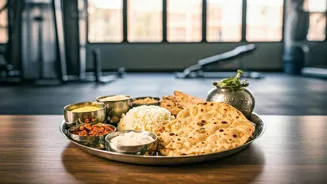Forget the treadmill! A new study, sparking conversations globally, suggests diet is king when it comes to weight management. This has significant implications for Indians, as we navigate the food scene.
The Big Debate
For years, the debate raged: Is it about moving less or eating more? The study looked at 4,213 adults. It measured energy expenditure with the 'doubly labeled water' method to track calorie burn, comparing it to body fat and BMI. It considers our unique eating habits and lifestyles in India, as we navigate a world of flavorful cuisines.
Energy Expenditure Breakdown
Researchers broke down energy expenditure into basal, activity, and total components. Basal energy expenditure (BEE) is calories at rest, activity energy expenditure (AEE) is from movement, and total (TEE) combines both. They compared these with BMI, body fat, and dietary intake data, offering insights relevant to diverse Indian lifestyles. It has become a topic of interest in India, sparking conversations and awareness.
The Surprising Findings
The study found overall calorie burn increasing with economic development, mainly due to larger body sizes. Basal and total energy expenditure dropped in developed populations, but activity expenditure stayed similar. Dietary intake, especially ultra-processed foods, strongly linked to higher body fat. This resonates with modern Indian food habits.
Diet Takes the Lead
Energy expenditure explained just 10% of increased BMI and body fat. Where data was available, ultra-processed food consumption was linked to higher body fat. Traditional diets showed lower obesity rates. This is particularly insightful for Indians, and we must prioritize fresh produce, lean proteins, and balanced meals.
Implications for India
This aligns with the 'constrained energy expenditure' model, even with activity differences, humans burn calories within a narrow range. The study underscores how crucial a good diet is. For India, this means focusing on traditional, wholesome foods like roti, sabzi, and dal, and making mindful choices to stay healthy, adapting the knowledge for us.

